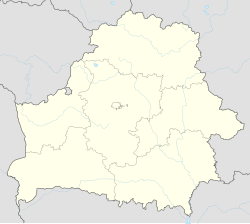Viciebsk
|
Vitebsk Vitebskas Witebsk װיטעבסק |
|||
|---|---|---|---|
|
|||
 |
|||
|
|||
| Coordinates: 55°11′N 30°10′E / 55.183°N 30.167°ECoordinates: 55°11′N 30°10′E / 55.183°N 30.167°E | |||
| Country |
|
||
| Voblast | Vitebsk Region | ||
| Founded | 947 | ||
| Government | |||
| • Chairman | Viktor Pavlovich Nikolaykin | ||
| Area | |||
| • Total | 124.54 km2 (48.09 sq mi) | ||
| Elevation | 172 m (564 ft) | ||
| Population (2015) | |||
| • Total | 366,299 | ||
| • Density | 2,900/km2 (7,600/sq mi) | ||
| Time zone | FET (UTC+3) | ||
| Postal code | 210000 | ||
| Area code(s) | +375-212 | ||
| License plate | 2 | ||
| Website | Official website | ||
Vitebsk or Vitsebsk (Belarusian: Ві́цебск, Łacinka: Viciebsk, pronounced [ˈvʲitsʲepsk]; Lithuanian: Vitebskas; Russian: Витебск, pronounced [ˈvʲitʲɪpsk]; Polish: Witebsk, Yiddish: װיטעבסק), is a city in Belarus. The capital of the Vitebsk Region, in 2004 it had 342,381 inhabitants, making it the country's fourth largest city. It is served by and Vitebsk air base.
Vitebsk developed from a river harbor where the Vitba River (Віцьба, from which it derives its name) flows into the larger Western Dvina, which is spanned in the city by the Kirov Bridge.
Archaeological research indicates that at the mouth of Vitba there were settlements by Baltic tribes, which were replaced in the 9th century by Slavic tribes Krivichs. According to the Chronicle of Michael Brigandine (1760), Vitebsk (also known mentioned as Dbesk, Vidbesk, Videbsk, Vitepesk, Vitbesk) was founded by Princess Olga of Kiev in 974. Other versions give 947 or 914. Academician Boris Rybakov and historian Leonid Alekseyev, based on the chronicles, have come to the conclusion that Princess Olga of Kiev could have established Vitebsk in 947. Leonid Alekseyev suggested that the chroniclers, moving the date from the account of the Byzantine era (since the creation of the world) to a new era, got the year 947, but later mistakenly written in copying manuscripts 974. an important place on trade route from the Varangians to the Greeks, by the end of the 12th century Vitebsk became a center of trade and commerce, became the center of an independent principality, following Polotsk, and at times, Smolensk and Kiev princes.
...
Wikipedia



